Fire Engulfs Industrial Zone In Iran's West Injuring Two
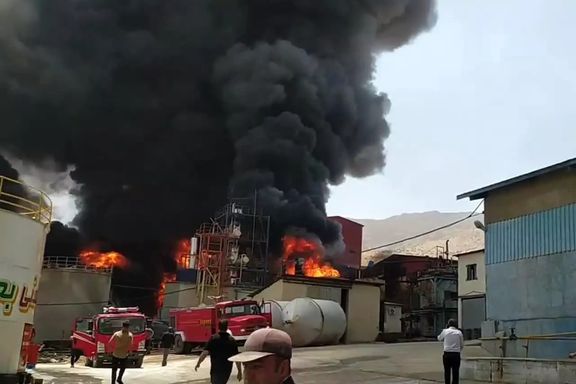
A massive fire erupted at an industrial zone in Doroud, southwest Iran on Wednesday leaving two people hospitalized.

A massive fire erupted at an industrial zone in Doroud, southwest Iran on Wednesday leaving two people hospitalized.
An official from the Lorestan provincial authority said the fire occurred in the tanks of the Gohar petro-refinery with 16 fire trucks dispatched to the scene. The cause of the blaze remains unknown.
Farhad Ziviar, the governor of Lorestan said all available equipment in Lorestan province, as well as neighboring provinces such as Markazi were mobilized to control the fire. Speaking from the scene, he said there were concerns about the spread of the fire to the gasoline tanks located in the vicinity.
In recent years, there have been a number of explosions and fires near Iran's military, nuclear, and industrial facilities.
In March, there was a large fire at three warehouses belonging to a home appliances manufacturer and in January, a huge fire broke out at an Iranian military industry factory in Esfahan in what was believed to be a suspected drone strike. Iran blamed the strike on Israel though the claims were never confirmed.
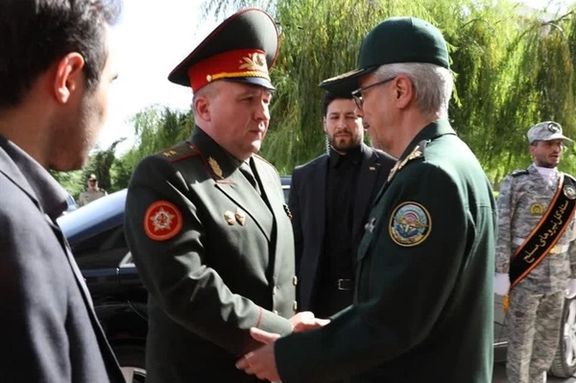
Iran and Belarus signed a defense cooperation deal, prompting the Iranian Armed Forces' General Staff to stress the importance of boosting mutual “defense ties”.
During a meeting with Viktor Gennadievich Khrenin, the Minister of Defense of Belarus, Mohammad Bagheri emphasized that global power shifts necessitate expanding security and military relations between Iran and Belarus.
The two sides also discussed the establishment of a joint commission for military cooperation.
Earlier, on Monday, Minister Khrenin signed a memorandum of understanding on defense cooperation with Mohammad Reza Ashtiani, the Iranian Defense Minister, in Tehran.
Details of the agreement have not been disclosed by the authorities of either nation. However, the Institute for the Study of War, a Washington-based think tank, published a report indicating Belarus' involvement in the establishment of an Iranian drone manufacturing plant in the south, specifically in the Gomel region.
Iran has faced extensive international criticism for supplying hundreds of Shahed-type kamikaze drones to Russia, reportedly used to target civilian infrastructure and residential areas in Ukraine. Additionally, American intelligence agencies have raised concerns about the construction of a drone factory in Russia with the assistance of the Islamic Republic.
Iran has supplied hundreds of drones to Russia since mid-2022, angering the United States and its key European allies who have imposed sanctions on a host of companies and individuals involved in their production and shipment to Russia.
Belarus is a key ally of Russia in its actions in Ukraine and a vital base for a portion of the Russian army and military mercenaries from the Wagner Group.
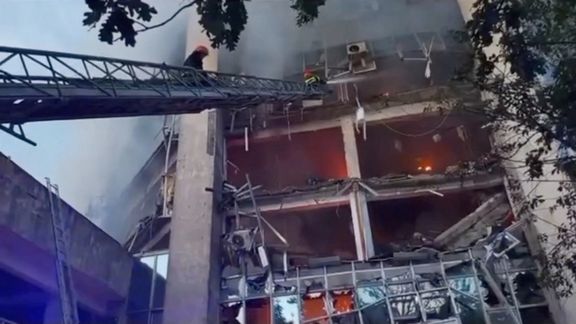
Moscow’s military launched over ten Iranian-made Shahed drones against Ukraine’s capital and several others at a grain export terminal in the south of the country.
The attacks on Wednesday destroyed buildings in the port of Izmail, near NATO member Romania, and halted ships in their tracks as they prepared to arrive there to load up with Ukrainian grain in defiance of a de-facto blockade Russia reimposed in mid-July.
"Russian terrorists have once again attacked ports, grain, global food security," President Volodymyr Zelenskiy said on Telegram.
Chicago wheat prices rose by nearly 5 percent following the attack due to concern about a hit to global supplies from Ukraine.

More than 10 drones launched against Kyiv were all shot down according to Ukraine’s military but falling debris caused fires and damage to residential areas.
Governor Oleh Kiper of the southern Odesa Oblast said that some of the Iranian drones flying toward the grain port were shot down but others got through inflicting heavy damage to grain exporting facilities. He appealed to Ukraine's partners to provide more air defense systems to defend against Russian strikes.
Iran has supplied Russia with hundreds of Shahed kamikaze drones since mid-2022 that have been extensively used against civilian and infrastructure targets.
The United States and its European allies have imposed several rounds of sanctions on Iran for the drone deliveries and warned Tehran to stop its arms supplies to Moscow. Iranian officials continue to deny sending the drones despite overwhelming physical evidence provided to Western government and media.

In the midst of a military exercise in the three contested islands of the Persian Gulf, the IRGC Navy Commander reiterated Iranian sovereignty.
Alireza Tangsiri advised regional states on Wednesday to avoid involvement in "divisive plans of extra-regional countries”.
The islands of Greater and Lesser Tunbs and Abu Musa in the Persian Gulf have been a longstanding territorial dispute between Iran and the United Arab Emirates.
During the exercise, Tangsiri did not explicitly name any specific country but referred to a joint statement made last month by Russia and Arab countries in the Persian Gulf supporting the UAE's claims over the islands.
Tangsiri called the islands "the honor of the great nation of Iran" and vowed to protect the Islamic homeland's territorial integrity.
The ongoing exercise showcased the presence of a special unit and a "600 km long-range missile for defending the islands' territory".
However, the UAE considers Iran's sovereignty over these islands illegal, adding to the complexity of the territorial disputes which has become an international geopolitical issue.
Like China did in December, Russia signed a statement with the Gulf Cooperation Council in early July challenging Iran's ownership of three islands.
Iranian Foreign Minister Hossein Amir-Abdollahian recently expressed deep dissatisfaction with Moscow's explanations regarding the joint statement, Russia one of the regime’s closest allies.
The revival of the dispute comes amid the Iranian regime's efforts to strengthen its relations with the likes of UAE and Saudi Arabia under President Ebrahim Raisi's leadership.
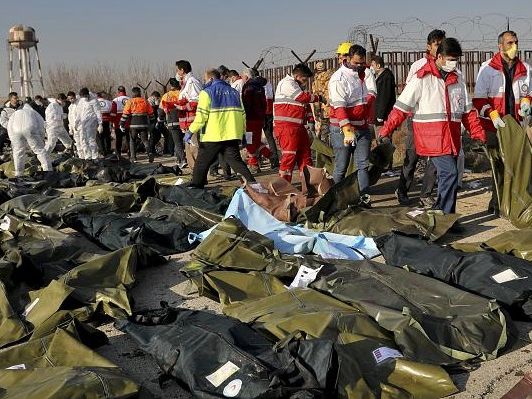
The Ontario Court of Justice once again declared that the shooting down of Flight PS752 by the Iranian regime constitutes "terrorist activity".
The court's ruling, issued on Monday, entitles the family plaintiffs of eight PS752 passengers to default judgment on liability, with damages set at $142 million. Each victim's family will receive over $16 million in damages and an additional $1 million for the pain and suffering caused by the tragic attack.
The court case was initiated by six individuals representing eight families of the victims of the flight. Notably, a similar verdict in favor of several other victims' families was previously issued in a case known as “Zarei et al vs Islamic Republic of Iran et al.”
Flight PS752 was shot down by two air-defense missiles fired by the IRGC shortly after taking off from Tehran's Imam Khomeini International Airport on January 8, 2020. The attack occurred in the aftermath of the IRGC's missile strikes on Iraqi bases hosting US troops, conducted in retaliation for the killing of IRGC Quds Force Commander Ghasem Soleimani in a US drone strike just five days earlier.
Tragically, all 176 passengers and crew members, including 63 Canadians, 10 Swedes, and 82 Iranian citizens, lost their lives in the disaster.

Amid increasing US restrictions on Iraqi banks to curb dollar smuggling to Iran, some politicians have revealed details about how the Tehran smuggles dollars.
Muhammad Nuri Aziz, a member of the Iraqi parliament, said on a television show Monday that Iraqi Prime Minister Mohammed Shia al-Sudani and the country’s central bank are aware of the schemes Iran uses to get hold of US dollars it desperately needs amid US sanctions. The lawmaker noted that the smuggling started during Mustafa Al-Kadhimi's term as prime minister and still continues.
Soran Omar, another member of Iraq’s parliament, told Iran International in an interview on Tuesday that at least 5,000 shell companies have been registered to facilitate the dollar smuggling network.
“It is true that in the cabinet of Mohammad Shia al-Sudani, there have been more efforts and preventive measures to curb dollar smuggling to Iran, showing better performance compared to previous governments. However, this does not mean a real halt," he said. “On the contrary, when one measure is adopted, another loophole for dollar smuggling is opened.”
Omar added that “unfortunately, most private banks in Iraq, which are backed by corrupt officials, are the main cause of dollar smuggling.” “It is quite clear that each of these banks are affiliated with which individuals,” he highlighted, suggesting that there is no resolve in the government to stop the smuggling.
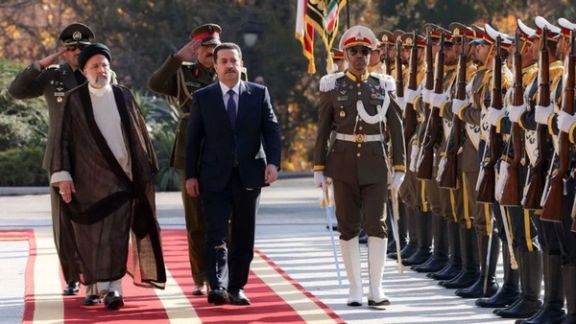
He warned that considering the new US measures against Iraqi banks to stop the flow of money to Iran, new channels may open to keep the smuggling ongoing.
A source with the Iraqi government told Iran International that following the recent restrictions by the US, a portion of the smuggling is being carried out through shell companies, electronic travel cards, online shops, exchange offices, and even suitcases.
According to the source, some people have created hundreds of electronic cards with different names and used them to buy $20,000 to $30,000 from Iraqi banks. Then, they cash the money in another country and transfer it to Iran.
"Some people have managed to smuggle more than one million dollars singlehandedly," the informed source said.
Reports about the transfer of $165 million to Iran within less than a month by just one exchange office led authorities to discover dozens of similar cases by other exchange offices.
Jamal Coujar, another Iraqi lawmaker, told Iran International that if the administration of Shia al-Sudani and the Central Bank do not take serious measures to prevent money laundering, fresh rounds of US sanctions will hit Iraqi banks.
The credibility of the Iraqi banking system has been tarnished due to the Islamic Republic's influence, and US sanctions have tightened their grip on Baghdad because evidently all Iraqi banks have had interactions with the Islamic Republic.
The only commercial gateway for exports and imports with Iran is Iraq, whose financial dealings with the regime are not properly supervised, Coujar said, adding that “billions of dollars have been transferred to Iran,” but authorities have remained silent. “It has become evident that all Iraqi banks have had interactions with Iran, and this situation has only benefited Iran and harmed Iraq,” he noted.
Last week, 14 Iraqi private banks sanctioned by Washington over helping to siphon US dollars to Iran said they were ready to challenge the measures and face audits and called on Iraqi authorities to provide assistance.
The US barred the Iraqi banks from conducting dollar transactions as part of a wider crackdown on dollar smuggling to Iran. The latest sanctions, along with earlier ones, have left nearly a third of Iraq's 72 banks blacklisted, two Iraqi central bank officials said.
The dinar tailspin against the dollar has worsened since the New York Federal Reserve imposed tighter controls on international dollar transactions by commercial Iraqi banks in November to halt the illegal siphoning of dollars to Iran.
Under curbs that took effect in January, Iraqi banks were required to use an online platform to reveal their transaction details. But most private banks have not registered on the platform and resorted to informal black markets in Baghdad to buy dollars.
Iran International revealed in May that an aide to former IRGC’s Quds force commander Qassem Soleimani, is a key figure in money laundering for Tehran. Iran International also reported some details about the inner workings of a Quds force unit tasked with smuggling money from Iraq to Iran, proving that the Islamic Republic’s embassy in Iraq is also involved in money laundering operations aimed at funneling revenues from oil and gas exports back to Iran.